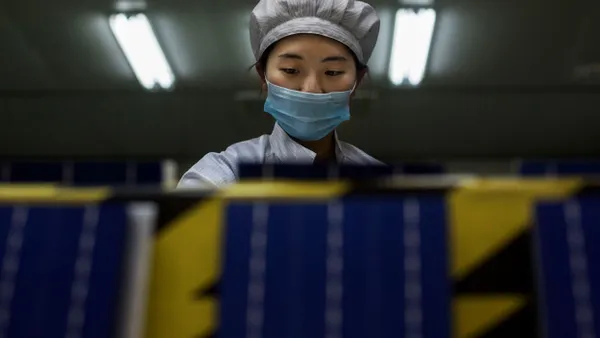Dive Brief:
- Duke Energy has joined the lobbying effort against potential tariffs on imported chrystalline silicon photovoltaic solar modules, warning in a letter that higher prices could lead to a slowdown in the development of solar projects — just as the resource is approaching price parity with other forms of energy.
- In May, the United States notified the World Trade Organization that it was considering imposing emergency tariffs on imported solar cells, following a request by manufacturers SolarWorld Americas and Suniva (which has filed for bankruptcy).
- Duke's warning to the U.S. International Trade Commission joins more than two dozen other companies opposed to the possible tariff. A decision on whether to proceed investigating the proposed tariff and floor-price is expected next month.
Dive Insight:
In a letter dated Aug. 21, Duke Energy Managing Director of Federal Policy Diane Denton told U.S. trade officials that a tariff on imported solar modules would raise the price of projects by 30% or more, "and that demand for modules would contract, perhaps even precipitously."
In its North Carolina service territory, Duke is a leader in solar energy. In the last five years, the utility has procured and invested in approximately 800 MW of solar generating facilities, with more than 250 MW in its regulated footprint. Duke's decision to insert itself into the debate highlights the extent to which the utility sector is supportive of growing renewables.
But the utility warned the ITC that "as solar energy is just approaching parity with the traditional grid resources in a number of states, a significant reduction in demand for new solar projects could deliver a serious blow to continuing development and evolution of this market."
The April proposal calls for ITC to develop a tariff and floor price on imported crystalline silicon photovoltaic solar panels. Suniva and SolarWorld have asked for a $0.40/watt tariff on imports and a floor price of $0.78/watt.
But according to Duke, "competitive module pricing has driven the robust growth of solar generation across the country, both for our company and the power sector at large."
The ITC heard testimony on the case earlier this month in a marathon 10-hour session.
"This is not just about Suniva and Solarworld,” Matthew J. McConkey, a lawyer from Mayer Brown representing Suniva, told the commission during the Aug. 15 hearing. The U.S. market is “literally strewn with the carcasses of shuttered solar manufacturers.”
On the other hand, Solar Energy Industries Association (SEIA) says that instituting a tariff and floor price would slow solar rollouts and put almost 90,0000 jobs on the chopping block. Utility solar development, and residential as well, could cede ground to other forms of energy. Solar accounted for nearly 40% of new capacity in 2016.














